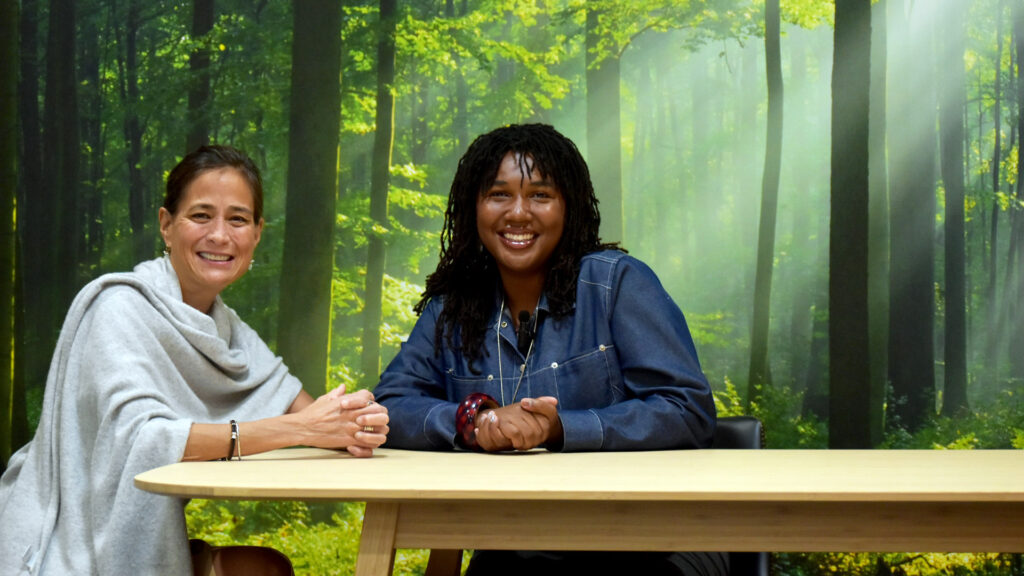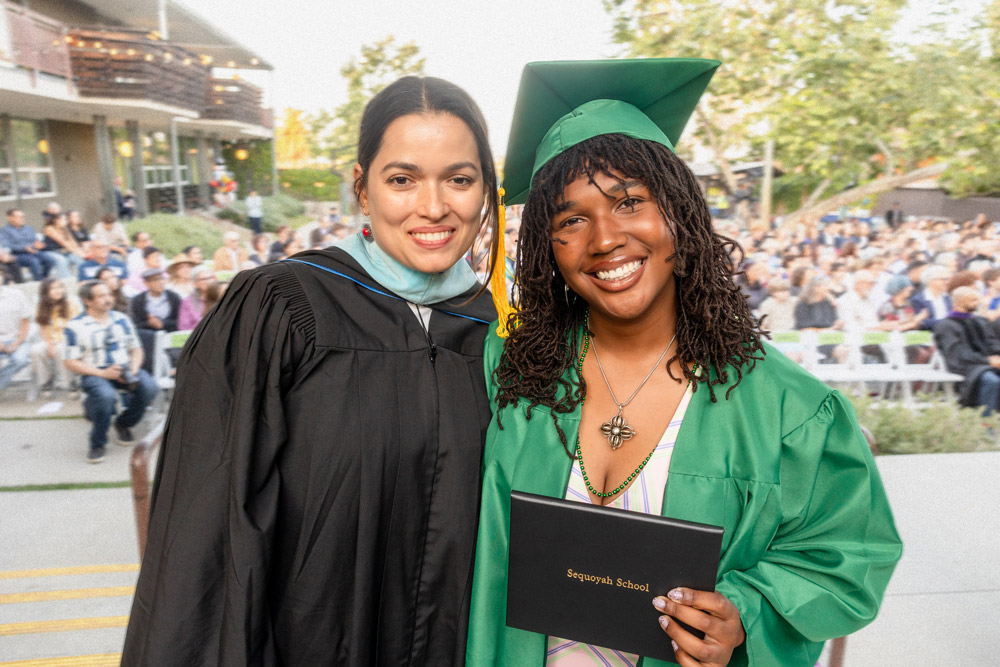
In Conversation
A Recipe for Empathy
Sanai Gibbs ‘25 was a sixth grader at Sequoyah when she discovered the miracle of an audience. The school was planning a Japanese-themed lunch and one of the adults thought a student should write a poem for the back of the menu. Sanai rose to the occasion and wrote a hymn to ramen, lyrical and unblushing.
The poem is on the next page; Sanai still recalls it with the smile one gives to a childhood photograph. Sequoyah printed it. Parents read it. Children saved it. Photographs of Sanai’s An Ode to Ramen, faint grease stains and all, were texted and framed alongside orthodontic milestones and soccer trophies. What impressed itself upon her mind was not that adults thought it lovely, but that words—once released—were migratory things: they traveled beyond her desk, attached themselves to strangers, and did work in the world. For a child, this was revelation enough: words were not mere decorations; they were utilities, like water or light.
Years later, in an interview for the prestigious Posse scholarship, a staffer greeted her with the salute: “You’re the rice girl.” A lesser spirit might have flinched at being reduced to starch. Sanai grinned. By then, the poem had ripened into a club called the Congregation of Rice Enjoyers, a “CORE” experience for many Sequoyah high school students.
“It’s really hard to hate someone if you make them a good meal,” she likes to say, with the confidence of a girl who has dissolved adolescent suspicion with a bowl of koshari. What began as a joke revealed itself as a blueprint: hospitality as strategy.
Sequoyah School teaches empathy not as ornament but as method, woven through mathematics as well as literature, and tested in the crucible of Field Studies, where six-mile sojourns and shared stoves become pop-up laboratories of civic life. And Rebecca Hong, the head of school, believes in young people learning to follow the thread of an argument without tangling themselves. “The work,” she says, “is to deepen the complication—not to flatten people into good or bad.”
Sanai recalls first seeing Hong when she toured campus as a finalist for the head position: “That’s the one.” With graduation looming, the two met in conversation to discuss life after Sequoyah, and how the school has shaped them both over the past few years.
“It’s probably going to hit at graduation,” Sanai predicts. “That’s probably when I’m going to cry.” Hong, who has graduated enough times to know the paradox, offers a consoling epilogue: “I met one of my best friends in the last week of college. So just so you know—you can still do it.” The heart, it seems, does not observe the academic calendar.
Empathy is Sequoyah’s curriculum, not as treacle but as technique. “Even in math,” Sanai says, “we learned about diverse mathematicians. It was everywhere.” Empathy here does not simply mean “I feel your feelings.” It means: I see you. I notice. I will not flatten you into myself.
“How does that become an academic strength?” Hong asks. Because empathy, properly trained, must illuminate more than a room’s warmth—it must sharpen the mind’s light.
Sanai remembers a course on the transatlantic slave trade: letters by a freed Black soldier and by a general whose twisted racism left students queasy. “Why are we reading this?” she wondered. But of course, unless one studies the grammar of oppression, how can one dismantle it?
Hong articulates the difficult virtue: “To understand someone’s logic, even if you don’t agree, can help you undo it. In a justice movement, it will always help you.”
Even debate, which Sanai dislikes, proved instructive. She had to defend positions she abhorred. “Why would we do this?” she asked. Because outrage, untutored, is poor fuel for change. “Know the enemy” is a phrase disfigured by history, but in the classroom it can be rehabilitated into civic rigor.
Since kindergarten, Sequoyah has dispatched its children into the wilderness. Parents blanch; students and alumni return alive, articulate, bearing blisters and philosophy. Sanai hated camping at first, then learned that in the backcountry friendship sprouts like lichen: slowly, stubbornly, without fertilizer. “I’ve never come back from a trip without a close new friend,” she says now. The bonds form in small negotiations—over a campfire, a blister, a joke whispered into darkness.
Time, Hong adds, is the secret ingredient: “You’re with people all day and night. You wouldn’t plan to see them otherwise, but a hill climbed together is a bond.” Curriculum developers may forget this; altitude remembers.
Classrooms, too, taught stamina disguised as style. In Humanities 1A, quick hands shot up like pistons. Discouragement lurked—until teachers slowed the tempo. Modern Language Association (MLA) citations were handwritten, twice daily, not as punishment but as civilization. Paragraphs were treated as houses; sentences, as rooms one could inhabit. “Make people want to read your writing,” they urged. For Sanai, this dovetailed with her ramen debut: writing is not therapy; it is hospitality.
Fantasy writing—pigeons with human legs, worlds that shrug off physics—seemed whimsical but proved a rehearsal for empathy. If you can conjure a person who never existed, you can imagine more generously the ones who do.
Not everything profound comes dressed for the part. CORE began as a joke—then fifty students showed up. Platters of jasmine, jollof, and congee passed hand to hand. A coalition was born. When the Posse staffer called her “Rice girl,” Sanai claimed the title gladly. Rice, after all, is the planet’s most democratic food: humble, everywhere, infinitely various. What better metaphor for a school that teaches difference without fetishizing it? “Food can heal the world,” she insists. The cynic counters with geopolitics; Sanai counters with dinner.
Her senior Talking Leaves presentation braided painting and prose: soul food as Black resilience, and a painted reconstruction of her grandparents’ dining room, lost in the Eaton Fire. No photographs survive. Only memory, pigment, and the stubborn desire to remake a vanished room. “It’s complicated,” Hong admits. “And that’s why it matters.” Elegy becomes petition: to protect Black homes from gentrification disguised as renewal.
If this seems too grand for a high-school capstone, you have not experienced Talking Leaves. It allows one to range: history, city planning, narrative, civic duty, all brought together as art. Sanai smiles: “I want to talk about food journalism.” Not coy: food, she believes, is both politics and pleasure.
Being Sequoyah’s first Posse Scholar is both a gift and a burden. Her gratitude is lavish: for her mother, an educator who taught her daughters to greet everyone; for teachers who “knew from day one” she would lead; for friends who sat with the freshman when they were juniors. And then comes duty: “What’s beautiful,” Hong says, “is that you being a Posse Scholar helps people know they can do it too.” The path is cut through tall grass; others may follow.
Drama, of course, thrives in small schools. Sanai found herself amid friendship breakups, unsure how to be loyal without betraying. If she could advise her ninth-grade self, she would plead: “It’s high school. It’ll disappear in three months.” Hong, teacherly, offers perspective: “From the big picture, you’ve been good at friendships across grades.”
To listen to Sanai talk about her teachers is to remember what education really is: apprenticeship of attention. MLA becomes respect for readers. Creative writing becomes rehearsal for empathy. Fantasy becomes permission to imagine otherwise. “Society puts you in a box,” her teacher said. “Fantasy helps you out.”
Hong phrases the larger truth: “You need imagination in science, in math, in engineering. Otherwise, no great work.”
The mind has no silos; only schools build them.
At the interview’s end, the photographer calls for one last portrait: Sanai leaning toward Rebecca, solidarity made geometry. Soon she will leave for Tulane, where rice is abundant and empathy is cuisine. If the world continues in its current mood, it will need more schools that teach children to argue against what they despise without despising the speaker, and more teenagers who can ladle hospitality into politics.
As the camera clicks, there is laughter. Someone jokes about crying “only five times.” Sanai beams: “This was so fun.” And Rebecca Hong, ever the teacher, leaves the benediction: deepen the complication.
The rest is ramen—and rice. A sixth-grade poem first taught a girl that pleasure in words could be a public good. That lesson grew into a club, into coalition, into scholarship, into the portrait of a head of school and a student leaning toward one another beneath Pasadena eucalyptus.
“Food can heal the world,” Sanai repeats, as steady as scripture. “It’s really hard to hate someone if you’ve shared a meal with them. That’s what I believe, and that’s what I’ll keep doing.”
